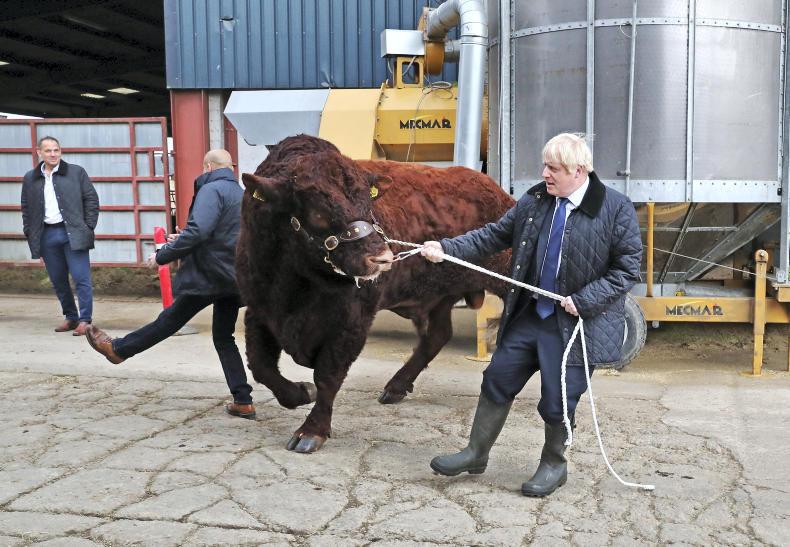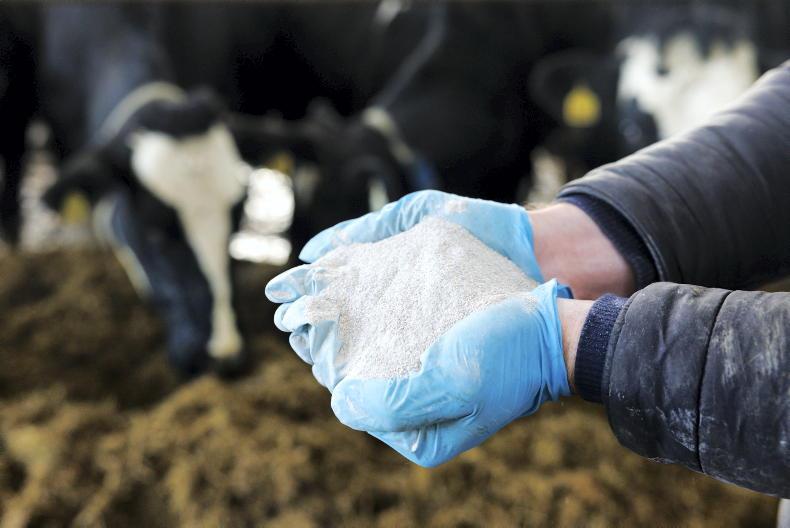The declaration by the British chancellor of the exchequer Sajid Javid that the UK would not align to EU production standards as part of a future trading agreement with the EU is a serious blow for Irish farmers and exporters. If that is the outcome of trade negotiations, it means that by the start of next year there will be a very definitive border between Britain and the EU27.
Due to the Irish protocol in the withdrawal agreement, Northern Ireland would remain aligned with the EU27 on standards and tariffs on goods coming into Northern Ireland from the rest of the UK, meaning that EU checks would have to be carried out at Northern Irish ports to ensure EU compliance.
Trade pre-single market
Not having standards aligned wouldn’t prevent trade between Ireland and Britain, it would just mean a return to the pre-single market arrangement that existed until 1993. Then, goods were checked in movements between EU countries. After the single market, goods produced in any member state could move freely and uninterrupted to any other member state. Losing this freedom between Ireland and Britain would mean increased administration and delays at ports of entry.
EU checks would have to be carried out at Northern Irish ports to ensure EU compliance
Standards of production are one of the core pillars of trade. The other is customs and tariffs. Although not mentioned specifically, it follows that if the UK is not going to align with the EU on standards, it is unlikely to align on customs tariffs. That presents an even greater threat to Irish and indeed UK farmers because the UK has indicated that in the absence of a free trade agreement, it would create a special 230,000t tariff-free beef quota open to all WTO member countries.
This would mean that the UK would become a lucrative market for the lowest cost beef-producing countries in the world, devaluing the market for both domestic production and Irish exports in the process.
The UK has emphasised its ambition to progress a free trade deal with the USA and is being encouraged in this by US president Donald Trump. It is thought that the negotiation with the US will start at the same time as with the EU, as a symbolic demonstration of the UK’s independence of the EU following Brexit. This will be a particularly interesting negotiation as access to the UK market for agricultural products will be a key US demand in the negotiation.
The US has made clear that it will be expecting the UK to accept US production standards on the use of hormones in beef and lactic acid in carcase washing. This puts the UK on a collision course with the EU and is in conflict with the UK’s stated policy of not accepting any reduction in standards post-Brexit. However, the UK may explain acceptance of US standards as not being lower than the EU by the fact that the US won a ruling to this effect at WTO more than a decade ago.
The US has made clear that it will be expecting the UK to accept US production standards on the use of hormones in beef and lactic acid in carcase washing
Any move from EU standards by the UK makes a trade agreement with the EU unlikely. Speaking to the Irish Farmers Journal last July, then Commissioner for Agriculture Phil Hogan made it clear the UK would have to maintain EU standards on third country imports to have a deal with the EU.
This suggests that the UK can have a trade deal with either the USA or the EU but not both. If the UK chooses the US with their standards, then it is bad new for Irish farmers, particularly beef producers. It will mean Irish beef sold to the UK will have the bureaucracy that comes with exporting outside the EU plus head-to-head competition with USA and South American product.
The European Commissioner for Trade Phil Hogan has been robust in his comments on negotiation of a future trading relationship with the UK after the UK finishes the transition period at the end of this year.
The weekend comments by Sajid Javid add to the position already stated by British prime minister Boris Johnson.
The prime minister has a reputation for policy changes but with another senior member of the government publically taking this position, it is at the very least a clear statement of opening negotiating position.
Farmers will be anxiously watching how the negotiation unfurls because it will have such a major impact on Irish trade from the beginning of January next year. This, along with the Green Deal in the EU and CAP reform, will shape the fortunes of Irish farming for the rest of this decade.
For farmers, this has to be a key issue in the general election campaign which hasn’t featured agriculture in any way during the opening days and should be raised by farmers with any candidate that calls looking for a vote.
UK finance minister declares that UK won’t align with the EU on production standards.This would mean increased bureaucracy and inspections on trade between the UK (excluding Northern Ireland) and the EU, with inspections for trade between Britain and Northern Ireland.UK ambitions for US trade deal parallel to future EU deal.Outcome of EU-UK negotiation along with CAP and EU’s green deal will dictate the fortunes of Irish farmers for the rest of this decade.Either US or EU deal, but not both.
The declaration by the British chancellor of the exchequer Sajid Javid that the UK would not align to EU production standards as part of a future trading agreement with the EU is a serious blow for Irish farmers and exporters. If that is the outcome of trade negotiations, it means that by the start of next year there will be a very definitive border between Britain and the EU27.
Due to the Irish protocol in the withdrawal agreement, Northern Ireland would remain aligned with the EU27 on standards and tariffs on goods coming into Northern Ireland from the rest of the UK, meaning that EU checks would have to be carried out at Northern Irish ports to ensure EU compliance.
Trade pre-single market
Not having standards aligned wouldn’t prevent trade between Ireland and Britain, it would just mean a return to the pre-single market arrangement that existed until 1993. Then, goods were checked in movements between EU countries. After the single market, goods produced in any member state could move freely and uninterrupted to any other member state. Losing this freedom between Ireland and Britain would mean increased administration and delays at ports of entry.
EU checks would have to be carried out at Northern Irish ports to ensure EU compliance
Standards of production are one of the core pillars of trade. The other is customs and tariffs. Although not mentioned specifically, it follows that if the UK is not going to align with the EU on standards, it is unlikely to align on customs tariffs. That presents an even greater threat to Irish and indeed UK farmers because the UK has indicated that in the absence of a free trade agreement, it would create a special 230,000t tariff-free beef quota open to all WTO member countries.
This would mean that the UK would become a lucrative market for the lowest cost beef-producing countries in the world, devaluing the market for both domestic production and Irish exports in the process.
The UK has emphasised its ambition to progress a free trade deal with the USA and is being encouraged in this by US president Donald Trump. It is thought that the negotiation with the US will start at the same time as with the EU, as a symbolic demonstration of the UK’s independence of the EU following Brexit. This will be a particularly interesting negotiation as access to the UK market for agricultural products will be a key US demand in the negotiation.
The US has made clear that it will be expecting the UK to accept US production standards on the use of hormones in beef and lactic acid in carcase washing. This puts the UK on a collision course with the EU and is in conflict with the UK’s stated policy of not accepting any reduction in standards post-Brexit. However, the UK may explain acceptance of US standards as not being lower than the EU by the fact that the US won a ruling to this effect at WTO more than a decade ago.
The US has made clear that it will be expecting the UK to accept US production standards on the use of hormones in beef and lactic acid in carcase washing
Any move from EU standards by the UK makes a trade agreement with the EU unlikely. Speaking to the Irish Farmers Journal last July, then Commissioner for Agriculture Phil Hogan made it clear the UK would have to maintain EU standards on third country imports to have a deal with the EU.
This suggests that the UK can have a trade deal with either the USA or the EU but not both. If the UK chooses the US with their standards, then it is bad new for Irish farmers, particularly beef producers. It will mean Irish beef sold to the UK will have the bureaucracy that comes with exporting outside the EU plus head-to-head competition with USA and South American product.
The European Commissioner for Trade Phil Hogan has been robust in his comments on negotiation of a future trading relationship with the UK after the UK finishes the transition period at the end of this year.
The weekend comments by Sajid Javid add to the position already stated by British prime minister Boris Johnson.
The prime minister has a reputation for policy changes but with another senior member of the government publically taking this position, it is at the very least a clear statement of opening negotiating position.
Farmers will be anxiously watching how the negotiation unfurls because it will have such a major impact on Irish trade from the beginning of January next year. This, along with the Green Deal in the EU and CAP reform, will shape the fortunes of Irish farming for the rest of this decade.
For farmers, this has to be a key issue in the general election campaign which hasn’t featured agriculture in any way during the opening days and should be raised by farmers with any candidate that calls looking for a vote.
UK finance minister declares that UK won’t align with the EU on production standards.This would mean increased bureaucracy and inspections on trade between the UK (excluding Northern Ireland) and the EU, with inspections for trade between Britain and Northern Ireland.UK ambitions for US trade deal parallel to future EU deal.Outcome of EU-UK negotiation along with CAP and EU’s green deal will dictate the fortunes of Irish farmers for the rest of this decade.Either US or EU deal, but not both. 









SHARING OPTIONS